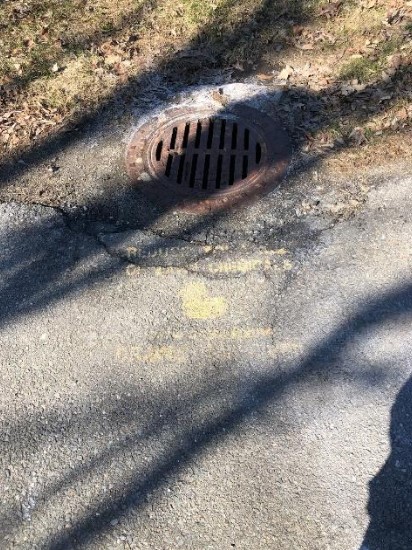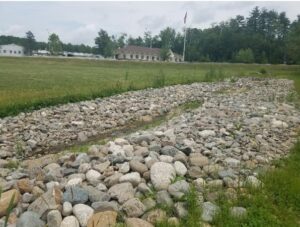
Storm Water Run Off
Stormwater runoff can be a problem, especially in urban areas like Bangor, Old Town, Orono, and even the University of Maine campus. Stormwater runoff is defined as rain that hits the ground or other horizontal surface and flows downhill to rivers, streams, lakes, and coastal waters. On-campus our runoff often collects pollutants like road salt, trash, cigarettes, and dirt/sediment. The runoff normally flows into storm drains around campus that serves as the major collection points that then drain to waterways (rivers, streams, wetlands). This water is not cleaned or filtered through the soil, which means that any pollutants in the water can be carried directly to the waterways and even eventually out to the ocean. The pollutants can vary and range from oil leaks and sediment from construction projects to the trash and chemical runoff from pesticides and fertilizers.
When it comes to stormwater runoff, the University of Maine is considered part of the Greater Bangor urban area because of population density. Urban areas have a large number of impermeable water surfaces, like pavement, sidewalks, parking lots, and even building rooftops. Being an urban area means that stormwater runoff control is especially important, and this is why the drainage system on campus is important to protect. The campus designates stormwater drainage locations with a painted rubber ducky. This is a project that students support during Maine Day, our yearly on-campus day of service, by stenciling the rubber ducky symbol on the drains each year. If you see one of these symbols, do not dump your trash down there; these drains empty into our nearby rivers!
Stormwater awareness through education and outreach, as well as public involvement, is part of what the University of Maine must do each year in order to comply with state and federal stormwater rules related to the Clean Water Act. There are groups that work with the University to help educate the campus community about stormwater runoff. UM is a member of the Bangor Area Stormwater Group (BASWG), a regional stormwater group that facilitates activities such as volunteer clean-up events, storm drain stenciling, and other community events talking about watersheds. The BASWG has several social media outlets for their regulated areas that contribute to public outreach as well.
What can you do as a student? Educate yourself on the local watersheds (Stillwater and Penobscot Rivers), and stay informed about and aware of pollutants that stormwater carries that will eventually enter the Penobscot and possibly make it all the way to the ocean. Another important note for students: don’t litter or throw garbage of any sort down the stormwater drains labeled with ducky symbols. Litter across campus can be easily swept away during a rainstorm and discharged into the waterways through those stormwater drains. Water that enters the stormwater drains is not treated, and therefore what goes in them becomes part of that discharge. The stormwater drainage system is regularly inspected for sediment, oil leaks, road salts, and other potential pollutants. As a student, you can protect our stormwater drainage systems by reducing your litter and becoming educated about stormwater pollution prevention.

